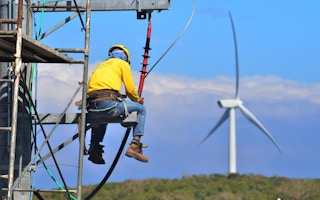With developing Asia set to build fewer solar plants and wind turbines this year amid the Covid-19 crisis, the region should turn to domestic suppliers for renewable energy installations, said Zhai Yongping, who heads the energy sector group of the Asian Development Bank (ADB).
Speaking at the ADB’s virtual Asia Clean Energy Forum, Zhai told over 4,000 participants from the region’s clean energy sector that travel restrictions during the pandemic have caused long delays in some developing countries in Asia, which rely on international consultants, contractors, and imported materials for their renewable energy projects.
For instance, companies in remote areas and island states in the Pacific which cannot build their own microgrid systems are “suffering” as revenue dries up due to a drop in energy demand and suspension of projects, he said.
“Learning from these experiences… the countries should develop local expertise for the design, installation, operations and maintenance of renewable energy technologies,” said Zhai, who spoke during a session titled Covid-19 and the Energy Sector: Technical Perspectives and Opportunities on 18 June.
Zhai, who has been working on energy development in Asia and Africa for close to three decades, noted that the extent of “local content” would vary depending on the size of the market and the country’s manufacturing capacity.
“
Countries should develop local expertise for the design, installation, operations and maintenance of renewable energy technologies.
Zhai Yongping, chief of energy sector group, Asian Development Bank (ADB)
Large countries like India are able to develop an entire supply chain of renewable energy technologies, from manufacturing key equipment to more job-intensive tasks like marketing and installations for end-users.
Although many developing countries in Asia and the Pacific lack the capacity to manufacture key equipment, they can develop the skills to install, operate and maintain renewable energy facilities.
Southeast Asian countries like Malaysia, Singapore, Vietnam and Thailand manufacture some photovoltaic components and assemble solar modules with imported cells and system integration. Noting that these are mostly for export to markets outside the region, Zhai urged these countries to target more regional markets as they develop.
The Philippines would be able to engage in manufacturing and assembly of renewable energy products including spare parts, since the country’s highly urbanised cities already have good industrial experience and capacity. It could set up special economic zones with international investments, while tapping its wealth of skilled workers for clean energy projects, he added.
Indonesia also has the potential to develop its own clean energy infrastructure, but needs to scale up its domestic market with stronger policy support, he noted.
Southeast Asia’s largest economy is one of the world’s biggest producers and exporters of coal, but in February, the Indonesian government prioritised passing new legislation on renewable energy.
“It is very important to develop the local demand with a sizable market, so that local manufacturing, operations and maintenance can be developed. The key is to ensure a renewable energy policy that is consistent and stable so investors can make their long-term investment decisions,” Zhai told Eco-Business.
ADB: Clean energy jobs must be part of Asia’s post Covid-19 recovery plans
In his opening remarks , ADB president Masatsugu Asakawa said clean energy jobs and investment must be part of Asia’s post-pandemic stimulus packages.
Although construction of new renewable energy projects have been affected by Covid-19, revenues from existing wind and solar projects have proven largely resilient to outbreak impacts since they do not require fuel supply, Zhai said.
At another panel session during the week-long forum, Jennifer Leisch, founder of United States-based clean energy consultancy Two Degrees Group, presented new research that highlighted how clean energy could help economic recovery following the pandemic.
“Clean energy can help create employment across global value chains and sectors, including manufacturing, finance, construction, and operations, maintenance. Moreover, clean energy draws on a diverse and inclusive employment pool, from unskilled labour all the way up to executive level positions,” stated the report, authored by US government-owned research group National Renewable Energy Laboratory.
It added that investing in clean energy to spur economy-wide job creation also contributed to decarbonisation and air quality improvement, which can result to healthcare savings, worker productivity, climate change impact reductions, and power sector resilience.

















